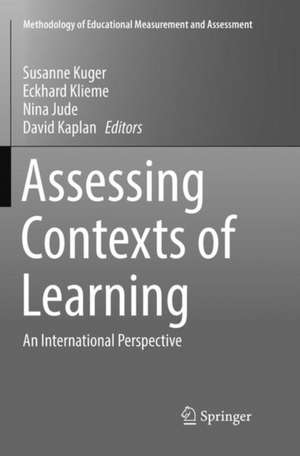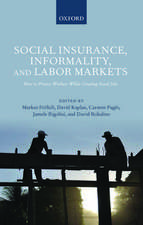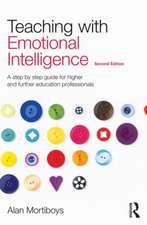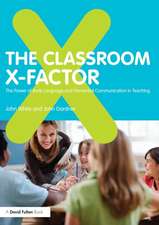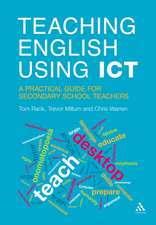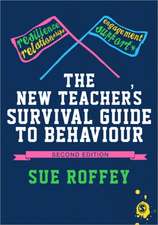Assessing Contexts of Learning: An International Perspective: Methodology of Educational Measurement and Assessment
Editat de Susanne Kuger, Eckhard Klieme, Nina Jude, David Kaplanen Limba Engleză Paperback – 11 iul 2018
This volume brings together educational effectiveness research and international large-scale assessments, demonstrating how the two fields can be applied to inspire and improve each other, and providing readers direct links to instruments that cover a broad range of topics and have been shown to work in more than 70 countries. The book’s initial chapters introduce and summarize recent discussions and developments in the conceptualization, implementation, and evaluation of international large-scale context assessments and provide an outlook on possible future developments. Subsequently, three thematic sections – “Student Background”, “Outcomes of Education Beyond Achievement”, and “Learning in Schools” – each present a series of chapters that provide the conceptual background for a wide range of important topics in education research, policy, and practice. Each chapter defines a conceptual framework that relates recent findings in the educational effectiveness research literature to current issues in education policy and practice.
These frameworks were used to develop interesting and relevant indicators that may be used for meaningful reporting from international assessments, other cross-cultural research, or national studies. Using the example of one particular survey (the Programme for International Student Assessment (PISA 2015)), this volume links all theoretical considerations to fully developed questionnaire material that was field trailed and evaluated in questionnaires for students and their parents as well as teachers and principals in their schools.
The primary purposes of this book are to inform readers about how education effectiveness research and international large-scale assessments are already interacting to inform research and policymaking; to identify areas where a closer collaboration of both fields or input from other areas could further improve this work; to provide sound theoretical frameworks for future work in both fields; and finally to relate these theoretical debates to currently available and evaluated material for future context assessments.
The primary purposes of this book are to inform readers about how education effectiveness research and international large-scale assessments are already interacting to inform research and policymaking; to identify areas where a closer collaboration of both fields or input from other areas could further improve this work; to provide sound theoretical frameworks for future work in both fields; and finally to relate these theoretical debates to currently available and evaluated material for future context assessments.
| Toate formatele și edițiile | Preț | Express |
|---|---|---|
| Paperback (1) | 954.31 lei 43-57 zile | |
| Springer International Publishing – 11 iul 2018 | 954.31 lei 43-57 zile | |
| Hardback (1) | 960.42 lei 43-57 zile | |
| Springer International Publishing – 15 dec 2016 | 960.42 lei 43-57 zile |
Preț: 954.31 lei
Preț vechi: 1163.80 lei
-18% Nou
Puncte Express: 1431
Preț estimativ în valută:
182.60€ • 191.17$ • 151.10£
182.60€ • 191.17$ • 151.10£
Carte tipărită la comandă
Livrare economică 07-21 aprilie
Preluare comenzi: 021 569.72.76
Specificații
ISBN-13: 9783319832746
ISBN-10: 3319832743
Ilustrații: XII, 490 p. 16 illus.
Dimensiuni: 155 x 235 mm
Greutate: 0.7 kg
Ediția:Softcover reprint of the original 1st ed. 2016
Editura: Springer International Publishing
Colecția Springer
Seria Methodology of Educational Measurement and Assessment
Locul publicării:Cham, Switzerland
ISBN-10: 3319832743
Ilustrații: XII, 490 p. 16 illus.
Dimensiuni: 155 x 235 mm
Greutate: 0.7 kg
Ediția:Softcover reprint of the original 1st ed. 2016
Editura: Springer International Publishing
Colecția Springer
Seria Methodology of Educational Measurement and Assessment
Locul publicării:Cham, Switzerland
Cuprins
Preface.- Foreword.- PART I: Introduction.- PART II: Student Background.- PART III: Outcomes of Education Beyond Achievement.- PART IV: Learning in Schools.- Acknowledgements.
Textul de pe ultima copertă
This volume brings together educational effectiveness research and international large-scale assessments, demonstrating how the two fields can be applied to inspire and improve each other, and providing readers direct links to instruments that cover a broad range of topics and have been shown to work in more than 70 countries. The book’s initial chapters introduce and summarize recent discussions and developments in the conceptualization, implementation, and evaluation of international large-scale context assessments and provide an outlook on possible future developments. Subsequently, three thematic sections – “Student Background”, “Outcomes of Education Beyond Achievement”, and “Learning in Schools” – each present a series of chapters that provide the conceptual background for a wide range of important topics in education research, policy, and practice. Each chapter defines a conceptual framework that relates recent findings in the educational effectiveness research literature tocurrent issues in education policy and practice.
These frameworks were used to develop interesting and relevant indicators that may be used for meaningful reporting from international assessments, other cross-cultural research, or national studies. Using the example of one particular survey (the Programme for International Student Assessment (PISA 2015)), this volume links all theoretical considerations to fully developed questionnaire material that was field trailed and evaluated in questionnaires for students and their parents as well as teachers and principals in their schools.
The primary purposes of this book are to inform readers about how education effectiveness research and international large-scale assessments are already interacting to inform research and policymaking; to identify areas where a closer collaboration of both fields or input from other areas could further improve this work; to provide sound theoretical frameworks for future work in both fields; andfinally to relate these theoretical debates to currently available and evaluated material for future context assessments.
These frameworks were used to develop interesting and relevant indicators that may be used for meaningful reporting from international assessments, other cross-cultural research, or national studies. Using the example of one particular survey (the Programme for International Student Assessment (PISA 2015)), this volume links all theoretical considerations to fully developed questionnaire material that was field trailed and evaluated in questionnaires for students and their parents as well as teachers and principals in their schools.
The primary purposes of this book are to inform readers about how education effectiveness research and international large-scale assessments are already interacting to inform research and policymaking; to identify areas where a closer collaboration of both fields or input from other areas could further improve this work; to provide sound theoretical frameworks for future work in both fields; andfinally to relate these theoretical debates to currently available and evaluated material for future context assessments.
Caracteristici
Provides a comprehensive collection of thematic reviews across a wide range of education effectiveness research topics Relates theoretical considerations in educational effectiveness research to international large-scale assessments Connects educational effectiveness research and international large-scale assessment to education policy and practice issues Offers guidance on questionnaire development in educational effectiveness research for national and international studies
